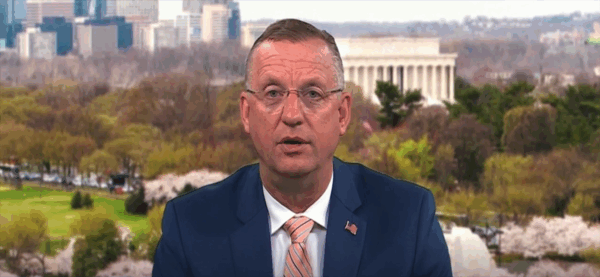
VA Secretary Doug Collins (Photo: Scripps News)
As the Trump administration nears its 100th day in its second term, Veterans Affairs Secretary Doug Collins is moving forward with plans to restructure the VA, including workforce reductions, contract cancellations, and shifts in internal operations. The department’s goal, according to Collins, is to operate with greater efficiency and focus on core services for Veterans.
“We’re going to serve Veterans and the needs that they have statutorily—healthcare benefits, disability benefits, education, housing, and all those kinds of things,” Collins said in a recent interview with Scripps News. “The biggest difference you’re going to see is a streamlining and really a focus on making sure that everything we do in the VA is efficiently serviced toward that Veteran process.”
As part of this effort, the department has ended nearly 600 contracts identified as “non-mission critical or duplicative,” paused some new hiring, and canceled contracts related to diversity, equity, and inclusion programs. Officials say these moves are intended to direct more resources toward Veteran care and benefits.
The potential reduction of up to 83,000 employees, nearly 15% of the VA’s workforce, has prompted questions from lawmakers and Veteran advocates about how the changes could affect access to services.
Collins said essential services such as healthcare and disability benefits will not be reduced. He stated that more than $300 million has been reallocated from administrative expenses to community care programs and other service-related initiatives.
“There’s no reduction in statutory benefits,” Collins stated, referring to services required by law, including those guaranteed under the PACT Act. The act expanded healthcare and benefits for Veterans exposed to burn pits and other toxic substances.
Reports of changes to Veteran healthcare and disability benefits have circulated in recent weeks. Collins said these reports are inaccurate and that the department remains focused on improving operations and modernizing its systems.
He is scheduled to appear before the Senate Veterans’ Affairs Committee on May 7, where he is expected to provide additional details and respond to questions about the department’s direction.
The department has made additional policy changes, including the end of certain programs for transgender Veterans and the scaling back of diversity and inclusion initiatives. These steps have received mixed reactions from lawmakers and Veteran groups.
Committee Chairman Jerry Moran (R-KS) said the hearing will be an opportunity to learn more about the administration’s vision for the VA and how it plans to maintain access to care and benefits for Veterans.
Despite the changes, Collins said the department will continue to carry out its mission of supporting Veterans. “There will always be a VA,” he said. “We’re working to ensure Veterans get the best care without unnecessary delays.”












